初中八种基本时态讲解及练习
中考初中八大时态讲解和练习

中考初中八大时态讲解和练习知识点一、八大时态的构成及识记§一般现在时概念:1. 表示经常性、习惯性的动作;2. 表示现时的情况或状态;3. 表示客观事实和普遍真理。
时间状语:always, often, usually, sometimes, once a week, every day等。
如果主句为一般将来时,由if, unless等引导的条件状语从句和when, until, as soon as等引导的时间状语从句常用一般现在时表示将来。
§一般过去时概念:表示过去发生的动作或存在的状态切动作已结束。
时间状语:... ago, last week, yesterday, just now, in 1988等。
§一般将来时概念:表示将要发生的动作或存在的状态以及打算、计划或准备要做的事。
时间状语:tomorrow, next month, in two days, soon等。
there be结构的一般将来时为there will be / there is going to be。
§过去将来时概念:表示在过去将来的某一时间发生的动作或存在的状态。
时间状语:the next day (morning, year...), the following month (week ...) 等。
此时态。
§现在进行时概念:表示现在或现阶段正在发生的动作。
时间状语及提示语:now, these days, at this moment, Listen! Look! 等。
§过去进行时概念:表示过去某一时刻或某一时间段内正在进行的动作。
时间状语:at that time, this time yesterday, at six yesterday, when + 从句(动词为过去式)等。
§现在完成时概念:1. 表示过去发生或已经完成的动作对现在造成的影响或结果;2. 表示从过去某时开始一直延续到现在的动作或状态。
初中八种基本时态讲解及练习
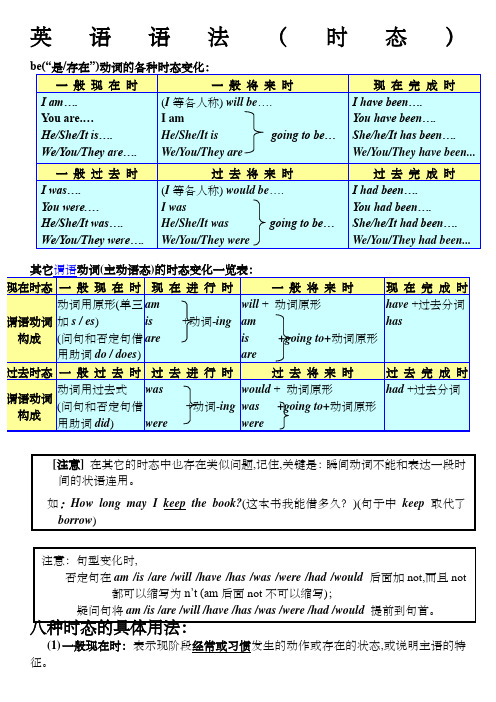
英语语法(时态)注意:句型变化时,否定句在am /is /are /will /have /has /was /were /had /would 后面加not,而且not 都可以缩写为n’t (am后面not不可以缩写);疑问句将am /is /are /will /have /has /was /were /had /would 提前到句首。
八种时态的具体用法:(1)一般现在时:表示现阶段经常或习惯发生的动作或存在的状态,或说明主语的特征。
①一般现在时句子中常有的时间状语:often,usually,sometimes,always,every(day等), once/twice,a (week等), on (Sunday等),never,in the (morning等)。
如:They go to the Palace Museum once a year.(他们每年去一次故宫)/ They often discuss business in the evening.(他们经常在晚上商谈生意)②表示客观真理、事实、人的技能或现在的状态时句子里一般不用时间状语。
如:The earth turns round the sun.(地球绕着太阳转)/Light travels faster than sound.(光传播比声音快)③表示十分确定会发生(如安排好的事情)或按照时间表进行的事情,用一般现在可以表达将来,句子中可以有将来时间。
如:The train for Haikou leaves at 8:00 in the morning.(开往海口的列车上午8点开车)④在时间状语从句中(以when, after, before, while, until, as soon as等引导)和条件状语从句中(以if,unless引导),用一般现在时代替一般将来时,句子可以有将来时间。
如:Please ring me up as soon as you arrive in Germany.(你一到德国就给我打电话) /If it rains tomorrow,we will have to stay at home.(如果明天下雨我们就只好呆在家)⑤一般现在时用于倒装句中可以表示正在发生的动作,动词以come, go为主。
初中八种基本时态讲解及练习精编版
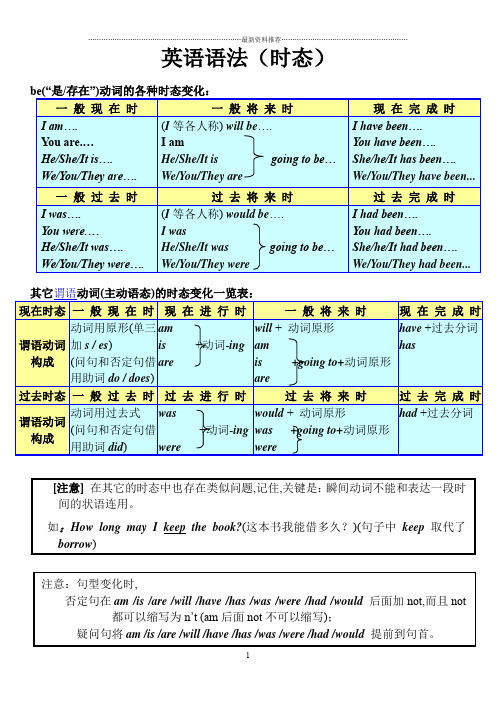
英语语法(时态)注意:句型变化时,否定句在am /is /are /will /have /has /was /were /had /would 后面加not,而且not 都可以缩写为n’t (am后面not不可以缩写);疑问句将am /is /are /will /have /has /was /were /had /would 提前到句首。
八种时态的具体用法:(1)一般现在时:表示现阶段经常或习惯发生的动作或存在的状态,或说明主语的特征。
①一般现在时句子中常有的时间状语:often,usually,sometimes,always,every(day等), once/twice,a (week等), on (Sunday等),never,in the (morning等)。
如:They go to the Palace Museum once a year.(他们每年去一次故宫)/They often discuss business in the evening.(他们经常在晚上商谈生意)②表示客观真理、事实、人的技能或现在的状态时句子里一般不用时间状语。
如:The earth turns round the sun.(地球绕着太阳转)/Light travels faster than sound.(光传播比声音快)③表示十分确定会发生(如安排好的事情)或按照时间表进行的事情,用一般现在可以表达将来,句子中可以有将来时间。
如:The train for Haikou leaves at 8:00 in the morning.(开往海口的列车上午8点开车)④在时间状语从句中(以when, after, before, while, until, as soon as等引导)和条件状语从句中(以if,unless引导),用一般现在时代替一般将来时,句子可以有将来时间。
如:Please ring me up as soon as you arrive in Germany.(你一到德国就给我打电话) /If it rains tomorrow,we will have to stay at home.(如果明天下雨我们就只好呆在家)⑤一般现在时用于倒装句中可以表示正在发生的动作,动词以come, go为主。
总时态讲解及练习

初中八时态时态复习一.一般现在时态经常发生的或习惯性的动作,主语具备的性格和能力结构:1.主(三单)+v-s/es+其他。
2. 非三单+v.+其他,否定句:主(三单)+doesn’t+v.+其他。
非三单+don’t+v.+其他。
疑问句:Does+主(三单)+v.+其他。
Do+非三单+v,+其他。
2,与之搭配的时间状语有:often ,usually,always,every day (与every连用的词组) on weekdays 等3,一般现在时的谓语动词有三种情况:(1)谓语动词be,I后面用am,第三人称后面用is,其余的后面都用are. (2)谓语是实意动词,即:当主语为第三人称单数时,谓语动词后面要加上s或es,其余的用原形。
(3)谓语是情态动词must,may, need ,have to, can等加动词原形。
4)动词第三人称单数的构成,a,)以s ,x ,sh,ch,o结尾的动词后加es.如,guss,fix ,teach,wash,go,do,等后面加es.b)以辅音字母加y结尾的动词改y为i再加es,如,fly,carry,study等c)注意发音:清清(/s/)浊浊/z/,ts发/ts/ds/dz/,es结尾的发/is/,原音和o后面的s 发/z/./ p / / t / / k / / f / / s / / / / / / / / / / // b/ / d / / g / /v / z / / / / / / / / / / / /练习(一).请用be动词的适当形式填空1.I___ ___a girl .My name__ ____Li Wei.2.Kate’s father______a worker.3.What ____ its name?4,What _____these? 5.How old _____you?6.____you good at soccer?7.____your brother in the classroom?8.Mike and Liu Tao ______at shool.(二),选择填空1,Joe_____an apple every day . A,does B do C eat D eats2,My mother often ____basketball game on Tv.A watchB seeC watchesD watchs3 .We ____a walk in the park on weekends.A haveB hasC takesD are.4.My brother _____his homework after shool every day.A doB doesC didD dos5. I ___eating ice cream . A likes B like C am D am like(三)翻译下列句子.1.我们现在踢足球吧, (let) ————————————————2.你喜欢吃鸡肉吗?(like)3,请把这些书拿到教室里去。
初中英语语法八大时态总结及练习题
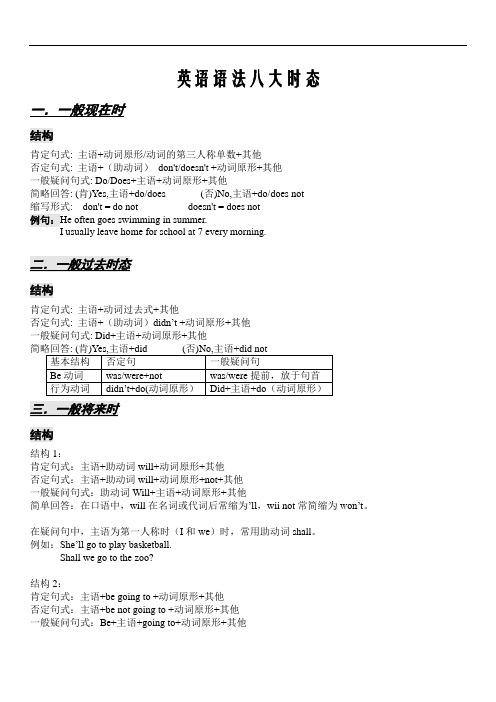
英语语法八大时态一.一般现在时结构肯定句式: 主语+动词原形/动词的第三人称单数+其他否定句式: 主语+(助动词)don't/doesn't +动词原形+其他一般疑问句式: Do/Does+主语+动词原形+其他简略回答: (肯)Yes,主语+do/does (否)No,主语+do/does not缩写形式: don't = do not doesn't = does not例句:He often goes swimming in summer.I usually leave home for school at 7 every morning.二.一般过去时态结构肯定句式: 主语+动词过去式+其他否定句式: 主语+(助动词)didn’t +动词原形+其他一般疑问句式: Did+主语+动词原形+其他基本结构否定句一般疑问句Be动词was/were+not was/were提前,放于句首行为动词didn’t+do(动词原形)Did+主语+do(动词原形)三.一般将来时结构结构1:肯定句式:主语+助动词will+动词原形+其他否定句式:主语+助动词will+动词原形+not+其他一般疑问句式:助动词Will+主语+动词原形+其他简单回答:在口语中,will在名词或代词后常缩为’ll,wii not常简缩为won’t。
在疑问句中,主语为第一人称时(I和we)时,常用助动词shall。
例如:She’ll go to play basketball.Shall we go to the zoo?结构2:肯定句式:主语+be going to +动词原形+其他否定句式:主语+be not going to +动词原形+其他一般疑问句式:Be+主语+going to+动词原形+其他简略回答:(肯)Yes,主语+be (否)No,主语+be not将来时其他表示法1)be going to表示将来表示说话人的打算、计划、安排或根据迹象判断必然或很可能发生的事情。
(完整word)初中英语八大时态的详细讲解与练习

初中英语语法:八种时态详解与练习一.概念:英语中表示不同时间发生的动作或存在的状态,需用不同的动词形式表示,这种不同的动词形式称为时态。
二.种类:(基本时态)一般现在时一般过去时现在进行时过去进行时一般将来时过去将来时现在完成时过去完成时一般现在时一、概念:经常、反复发生的动作或行为及现在的某种状况。
二、常搭配的时间状语:always, usually, often, sometimes, every week (day, year, month…), once a week,on Sundays, etc.三、基本结构①be动词(is,am,are);②行为动词(主语是第三人称单数时谓语动词要加s或es外) 否定形式:①am/is/are+not;②此时态的谓语动词若为行为动词,则在其前加don't,如主语为第三人称单数,则用doesn't,同时还原行为动词。
一般疑问句:①把be动词放于句首;②用助动词do提问,如主语为第三人称单数,则用does,同时,还原行为动词。
例句:I go to school at 6 every morning. 每天早上我七点去上学。
Summer follows spring. 春天之后是夏天。
I learned that the earth goes around the sun when I was in primary school. 我在小学就学过地球是围绕太阳转的。
Pride goes before a fall. 骄者必败。
四、基本用法:1) 描述当前时间内经常出现、反复发生的动作或存在的状态。
在这种情景中,句子常带有表示频率的时间状语:always , everyday , often , once a week (month , year , etc.) , sometimes , seldom , usually等等,以表示句中的动作或状态是习惯性的、经常性的。
初中英语八大时态全套精讲及练习题(附答案)
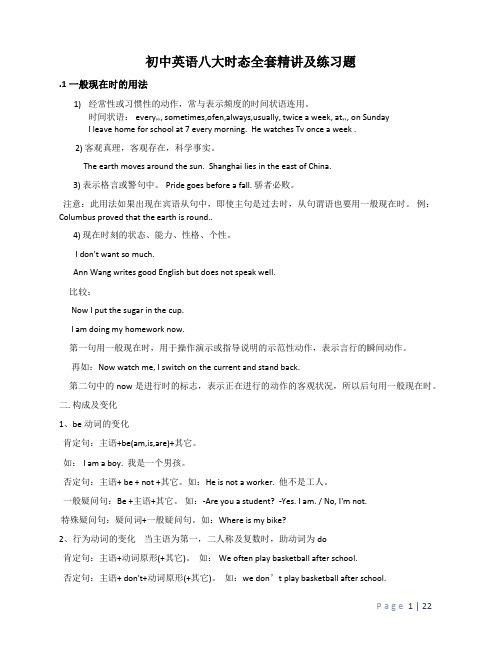
初中英语八大时态全套精讲及练习题.1 一般现在时的用法1)经常性或习惯性的动作,常与表示频度的时间状语连用。
时间状语: every…, sometimes,ofen,always,usually, twice a week, at…, on SundayI leave home for school at 7 every morning. He watches Tv once a week .2) 客观真理,客观存在,科学事实。
The earth moves around the sun. Shanghai lies in the east of China.3) 表示格言或警句中。
Pride goes before a fall. 骄者必败。
注意:此用法如果出现在宾语从句中,即使主句是过去时,从句谓语也要用一般现在时。
例:Columbus proved that the earth is round..4) 现在时刻的状态、能力、性格、个性。
I don't want so much.Ann Wang writes good English but does not speak well.比较:Now I put the sugar in the cup.I am doing my homework now.第一句用一般现在时,用于操作演示或指导说明的示范性动作,表示言行的瞬间动作。
再如:Now watch me, I switch on the current and stand back.第二句中的now是进行时的标志,表示正在进行的动作的客观状况,所以后句用一般现在时。
二. 构成及变化1、be动词的变化肯定句:主语+be(am,is,are)+其它。
如: I am a boy. 我是一个男孩。
否定句:主语+ be + not +其它。
如:He is not a worker. 他不是工人。
初中英语八大时态详细语法解析习题及答案
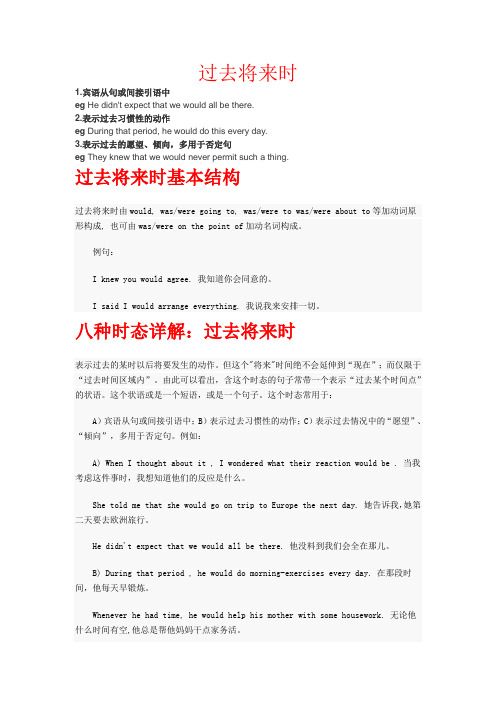
过去将来时1.宾语从句或间接引语中eg He didn't expect that we would all be there.2.表示过去习惯性的动作eg During that period, he would do this every day.3.表示过去的愿望、倾向,多用于否定句eg They knew that we would never permit such a thing.过去将来时基本结构过去将来时由would, was/were going to, was/were to was/were about to等加动词原形构成, 也可由was/were on the point of加动名词构成。
例句:I knew you would agree. 我知道你会同意的。
I said I would arrange everything. 我说我来安排一切。
八种时态详解:过去将来时表示过去的某时以后将要发生的动作。
但这个"将来"时间绝不会延伸到“现在”;而仅限于“过去时间区域内”。
由此可以看出,含这个时态的句子常带一个表示“过去某个时间点”的状语。
这个状语或是一个短语,或是一个句子。
这个时态常用于:A)宾语从句或间接引语中;B)表示过去习惯性的动作;C)表示过去情况中的“愿望”、“倾向”,多用于否定句。
例如:A) When I thought about it , I wondered what their reaction would be . 当我考虑这件事时,我想知道他们的反应是什么。
She told me that she would go on trip to Europe the next day. 她告诉我,她第二天要去欧洲旅行。
He didn't expect that we would all be there. 他没料到我们会全在那儿。
中考初中英语语法八大时态总结(附答案)
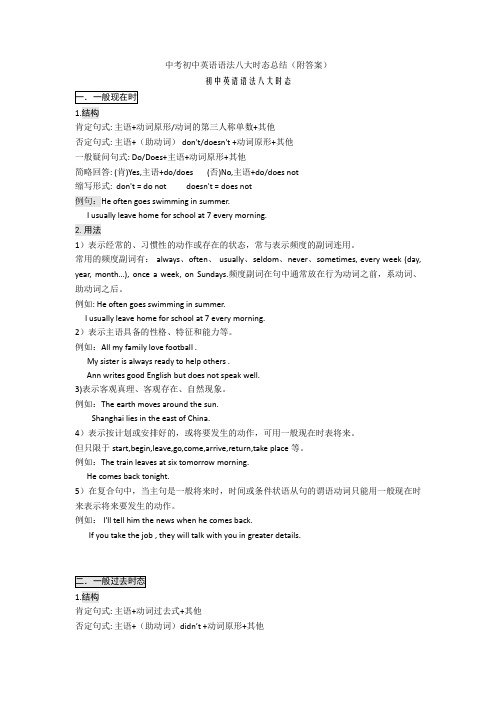
中考初中英语语法八大时态总结(附答案)初中英语语法八大时态1.结构肯定句式: 主语+动词原形/动词的第三人称单数+其他否定句式: 主语+(助动词) don't/doesn't +动词原形+其他一般疑问句式: Do/Does+主语+动词原形+其他简略回答: (肯)Yes,主语+do/does (否)No,主语+do/does not缩写形式: don't = do not doesn't = does not例句:He often goes swimming in summer.I usually leave home for school at 7 every morning.2.用法1)表示经常的、习惯性的动作或存在的状态,常与表示频度的副词连用。
常用的频度副词有: always、often、 usually、seldom、never、sometimes, every week (day, year, month…), once a week, on Sundays.频度副词在句中通常放在行为动词之前,系动词、助动词之后。
例如: He often goes swimming in summer.I usually leave home for school at 7 every morning.2)表示主语具备的性格、特征和能力等。
例如:All my family love football .My sister is always ready to help others .Ann writes good English but does not speak well.3)表示客观真理、客观存在、自然现象。
例如:The earth moves around the sun.Shanghai lies in the east of China.4)表示按计划或安排好的,或将要发生的动作,可用一般现在时表将来。
初中英语八大时态讲解及练习(含答案)
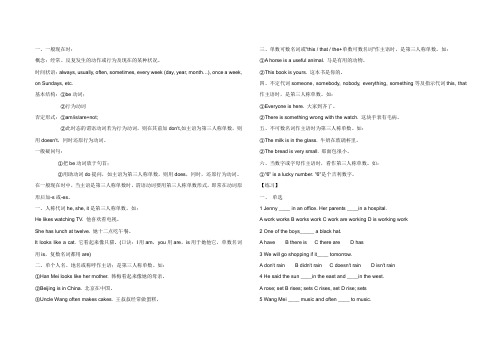
一、一般现在时:概念:经常、反复发生的动作或行为及现在的某种状况。
时间状语:always, usually, often, sometimes, every week (day, year, month…), once a week, on Sundays, etc.基本结构:①be动词;②行为动词否定形式:①am/is/are+not;②此时态的谓语动词若为行为动词,则在其前加don't,如主语为第三人称单数,则用doesn't,同时还原行为动词。
一般疑问句:①把be动词放于句首;②用助动词do提问,如主语为第三人称单数,则用does,同时,还原行为动词。
在一般现在时中,当主语是第三人称单数时,谓语动词要用第三人称单数形式,即常在动词原形后加-s或-es。
一、人称代词he, she, it是第三人称单数。
如:He likes watching TV. 他喜欢看电视。
She has lunch at twelve. 她十二点吃午餐。
It looks like a cat. 它看起来像只猫。
(口诀:I用am,you用are,is用于她他它,单数名词用is,复数名词都用are)二、单个人名、地名或称呼作主语;是第三人称单数。
如:①Han Mei looks like her mother. 韩梅看起来像她的母亲。
②Beijing is in China. 北京在中国。
③Uncle Wang often makes cakes. 王叔叔经常做蛋糕。
三、单数可数名词或"this / that / the+单数可数名词"作主语时,是第三人称单数。
如:①A horse is a useful animal. 马是有用的动物。
②This book is yours. 这本书是你的。
四、不定代词someone, somebody, nobody, everything, something等及指示代词this, that 作主语时,是第三人称单数。
中考英语八大时态精解+精练+答案

中考英语八大时态精解+精练+答案一、一般现在时1、概念:表示经常发生的情况;有规律出现的情况;总是发生的;事实真理。
2.时间状语:Always, usually, often, sometimes, every week (day, year, month…), once a week (day, year, month…), on Sundays (on Mondays…), etc.3.基本结构:主语+动词原形(如主语为第三人称单数,动词上要改为第三人称单数形式)4.否定形式:主语+am / is / are+not+其他;此时态的谓语动词若为行为动词,则在其前加don't,如主语为第三人称单数,则用doesn't,同时还原行为动词。
5.一般疑问句:把be 动词放于句首;用助动词do 提问,如主语为第三人称单数,则用does,同时,还原行为动词。
eg:①It seldom snows here. 这里很少下雪。
②He is always ready to help others. 他总是乐于帮助别人。
③Action speaks louder than words. 事实胜雄辩。
二、一般过去时1.概念:过去某个时间里发生的动作或状态;过去习惯性、经常性的动作、行为。
2.时间状语:ago,yesterday,the day before yesterday,last week,last (year,night,month…), in 1989, just now, at the age of 5, one day, long long ago, once upon a time,etc.3.基本结构:主语+动词的过去式或be 的过去式+名词4.否定形式:主语+was / were+not+其他;在行为动词前加didn't,同时还原行为动词。
5.一般疑问句:was 或were 放于句首;用助动词do 的过去式did 提问,同时还原行为动词。
初中英语八大时态讲解及练习(全)之欧阳美创编
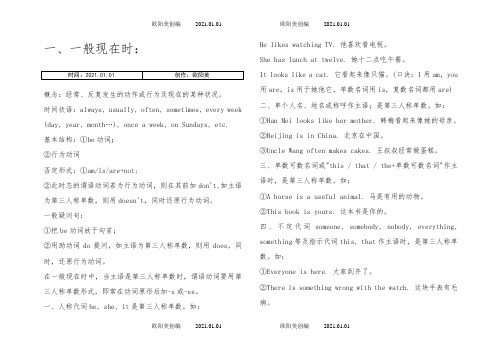
一、一般现在时:概念:经常、反复发生的动作或行为及现在的某种状况。
时间状语:always, usually, often, sometimes, every week (day, year, month…), once a week, on Sundays, etc.基本结构:①be动词;②行为动词否定形式:①am/is/are+not;②此时态的谓语动词若为行为动词,则在其前加don't,如主语为第三人称单数,则用doesn't,同时还原行为动词。
一般疑问句:①把be动词放于句首;②用助动词do提问,如主语为第三人称单数,则用does,同时,还原行为动词。
在一般现在时中,当主语是第三人称单数时,谓语动词要用第三人称单数形式,即常在动词原形后加-s或-es。
一、人称代词he, she, it是第三人称单数。
如:He likes watching TV. 他喜欢看电视。
She has lunch at twelve. 她十二点吃午餐。
It looks like a cat. 它看起来像只猫。
(口诀:I用am,you 用are,is用于她他它,单数名词用is,复数名词都用are) 二、单个人名、地名或称呼作主语;是第三人称单数。
如:①Han Mei looks like her mother. 韩梅看起来像她的母亲。
②Beijing is in China. 北京在中国。
③Uncle Wang often makes cakes. 王叔叔经常做蛋糕。
三、单数可数名词或"this / that / the+单数可数名词"作主语时,是第三人称单数。
如:①A horse is a useful animal. 马是有用的动物。
②This book is yours. 这本书是你的。
四、不定代词someone, somebody, nobody, everything, something等及指示代词this, that作主语时,是第三人称单数。
初中八大时态讲解与练习
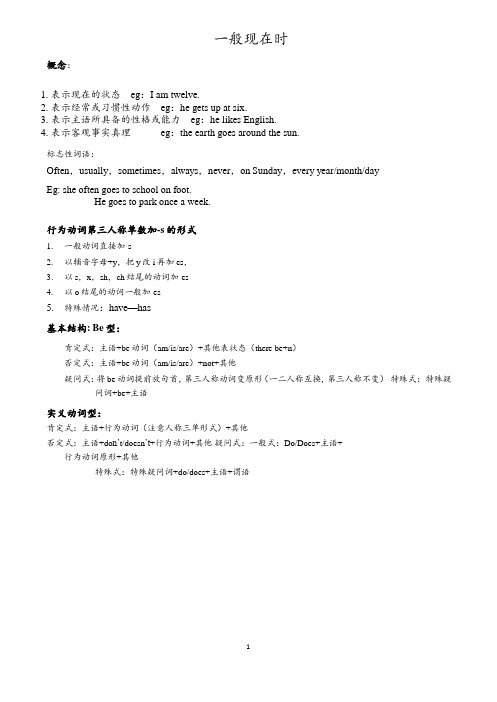
一般现在时概念:1. 表示现在的状态eg:I am twelve.2. 表示经常或习惯性动作eg:he gets up at six.3. 表示主语所具备的性格或能力eg:he likes English.4. 表示客观事实真理eg:the earth goes around the sun.标志性词语:Often,usually,sometimes,always,never,on Sunday,every year/month/dayEg: she often goes to school on foot.He goes to park once a week.行为动词第三人称单数加-s 的形式1. 一般动词直接加-s2. 以辅音字母+y,把 y 改 i 再加 es,3. 以 s,x,sh,ch 结尾的动词加-es4. 以 o 结尾的动词一般加-es5. 特殊情况:have—has基本结构: Be 型:肯定式:主语+be 动词(am/is/are)+其他表状态(there be+n)否定式:主语+be 动词(am/is/are)+not+其他疑问式:将 be 动词提前放句首,第三人称动词变原形(一二人称互换,第三人称不变)特殊式:特殊疑问词+be+主语实义动词型:肯定式:主语+行为动词(注意人称三单形式)+其他否定式:主语+do n’t/doesn’t+行为动词+其他疑问式:一般式:Do/Does+主语+行为动词原形+其他特殊式:特殊疑问词+do/does+主语+谓语小试牛刀:写出下列动词的第三人称形式wash:match:study:finish:go:snow:carry:stop: see: drive:let:teach:keep: join: put:do: drink: toy: play: begin:take:run: fly: talk: stay:look:watch:think:carry:fix:单项选择1. There an English film at the cinema now.A:is B:are C:am D:be2. The picture nice.A:look B:looks C:looked D:be look3. He sits down and soon asleep.A:fall B:falling C:falled D: falls4. The water sweet.A:drinking B:drinks C:drink D:to drink5. I up at six but Mike up at sevenA:get,gets B:get ,get C:gets,get D:getting, to get6. My father for eight hours every day.A:working B:works C:work D:to work7. Uncle Wang never English, because he know how to say it.A:speak,doesn’t B:speak,don’t C:speaks,don’t D:speaks,doesn’t 8. On Sunday my daughter watching TV and my son to play footballwith his friends.A:like,want B:likes,want C:like,wants D:likes,wants 9. Su Yang usually some clothes on Sunday.A:washed B:washs C:washes D:washing 10. Su Hai and Su Yang eight lessons this term.A:have B:has C:haves D:having用所给词的正确形式填空A. We often (not play)on the playground.B.you (brush) your teeth every day.C. How many lessons your classmate (have) on Sunday.D. It (take) me two hours to finish my homework every day.E. The child often (watch) TV in the evening.F. What (do) he usually (do) after school.G. John (study) Math , Chinese ,English ,Science and Art at school.H. Mr. Wang often (go) to Shanghai.I. There (be) a football match on TV every morning.J. We (not watch)TV on Monday.句式训练➢Do you like to play football after school?肯定句肯定/否定回答:➢I have many books.否定句:一般疑问句:肯定回答:否定回答:➢Nancy doesn’t run fast.肯定句:➢I usually play football on Friday afternoon.否定句:一般疑问句:特殊疑问句:肯定/否定回答:➢Tom does his homework at home.否定句:一般疑问句:特殊疑问句:➢Mike has two letters for him.否定句:一般疑问句:特殊疑问句:否定回答:判断正误1. Is your brother speak English?2. Does he likes going fishing?3. Jane do his homework every morning.4. He like play basketball with his friends.5. We eats dinner at six and go to bed at eleven.6. My dog runs fast.7. He speak English very well.8. What do they usually do on Saturday.9. My mother don’t have breakfast this morning.10. I like reading books on the library every day.中考真题1.Jenny! Do you know that one-third of the boys in our class the singer Zhang Shao Han?A. likeB. likesC.liking2. The sense of happiness will increase if you what you like to do.A. doB. didC. will do3. Betty will ring me up when she inBeijing.A. arriveB. arrivesC. arrivedD. willarrive4. If you your homework, you can go out to play football.5.Now my father his bike to work every day instead of driving.A. rideB. r od eC. ridesD. will ride6. This girl is rea d y t o help p eo pl e an y time. Wh e n sh e is on t h e bu s,sh e al w a y s her seat to someone in need.A. givesB. giveC. gaveD.giving概念:一般过去时表示过去某个时间収生的动作或存在的状态. Eg: I got up at seven yesterday表示过去经常収生的动作或存在的状态. Eg: he always went to school by car last term标志性词语:yesterday,last month/year/week/night,the day before yesterday,in the past,at that time,two days ago,just n ow……..动词过去时的变化规则:一般在词尾直接+ed play——played以 e 结尾的动词直接+d taste—— tasted末尾三个字母以“辅+元+辅”且为重读闭音节,双写末尾辅音+ed stop——stopped以辅音字母+y,改 y 为 i 再+ed study——studied不规则动词过去式:am/is: a re:do:see:sa y:give: eat:w rit e: sp en d:get:take:sp eak:drin k:g o:r un:rid e:sle ep:c o me:sin g:swim:s t and:has/ha ve:pu t:sit:rea d:结构:Be 型肯定式:主语+be 动词(was/were)+其他否定式:主语+wasn’t/weren’t+其他疑问式:Be 动词+主语+其他(一二人称互换,第三人称不变)特殊疑问句:特殊疑问词+was/were+主语+其他实义动词型肯定式:主语+动词过去式+其他否定式:主语+didn’t+动词原形+其他疑问式:Did+主语+动词原形+其他特殊疑问句:特殊疑问词+did+主语+动词原形+其他用所给单词正确形式填空◆We (enjoy) ourselves at the party last night.◆Jack (study) for the English test last Sunday.◆ you (go) to the Great Wall last year?◆What day (be) it yesterday?◆The old man (be)ill and went to see a doctor.◆We (have) a party last night.◆We (visit) the museum and went home.◆—How (be) the students? —They were very friendly.◆My mother (not do) housework yesterday.◆—he (have) lunch at nine? —No, he did n’t.◆They (buy) a guitar yesterday.◆the cat (eat)a bird yesterday night.◆They (play)chess in the classroom last PE lesson.◆Nancy (pick)up orange on the farm last week.◆My mother (cook)a nice food last spring festival.◆I (be)at school just now.◆He (be)at the camp last week.◆The mobile phone (be)on the table yesterday evening.◆I (make)a model ship with Mike yesterday.◆What (do)you do last month.单项选择( ) 1. Lee his mobile phone at home.A. leaveB. leavesC. leavedD. left( ) 2. he a good rest? No, he didn’t.A. Do, hadB. Did, haveC. Did, hadD. Was, had( ) 3. As soon as he , he to his family.A. arrived, writesB. arrived, writtenC. arrived, wroteD. arriveds, write( ) 4. Mr. Black was late because he his way.A. lostedB. loseC. losesD. lost( ) 5. When Lee school this morning?A. did, got toB. did, get toC. did, getD. did, got( ) 6. Will you please say it again? I quite you.A. didn’t, hearB. don’t, heardC. didn’t, heardD. don’t, hear ( ) 7. you at six o’c lock yesterday?A. Do ,get upB. Did, get upC. Do, got upD. Did, got up ( ) 8.What did you see ?A. nowB. every dayC. these daysD. just now ( ) 9.He went into the room and the door.A. lockB. lockingC. locksD. locked ( ) 10. —What you last week? —I bought a bag.A. did ,buyB. did , boughtC. do, buyD. do, bought ( ) 11. —he his lunch? —Yes, he did.A. Does ,hasB. Does, haveC. Did, haveD. Did, had ( )12.—Did the thieves into the car? —No, they .A. fell, did n’tB. fall(落下), didC. jump(跳), didn’tD. jump, did ( ) 13. -When did May come back from Hong Kong?-She from Hong Kong last Friday.A. come backB. comes backC. returned backD. came back ( ) 14. she this dictionary in the bookshop nearby last week?A. Did, buyB. Does, buyC. Did, boughtD. Does, buys ( ) 15. He to the station this morning and was for the train.A. hurry, in timeB. hurries, on timeC. hurried, in timeD. hurried, at time句型转换1. Frank read an interesting book about history. (一般疑问句)Frank an interesting book about history?2. Thomas spent RMB 10 on this book. (否定句)Thomas RMB 10 on this book.3. I didn’t have any friends. (一般疑问句)have friends?4. She watched TV after supper(划线部分提问)she after supper.5. There was some orange in the fridge.(一般疑问句)there_ orange in the fridge?改错题1. How is Jane yesterday?2. He go to school by bus last week.3. He often goes home at 6:00 last month.4. I can fly kites seven years ago.5. Did you saw him just now.6. Tom wasn’t watch TV last night.7. I didn’t my homework yesterday. 8. He wait for you three hours ago.9. Who find it just now ? 10. What did he last week?综合训练1.They read English last night.否定句:一般疑问句:肯定/否定回答:划线部分提问:2.She didn’t buy a dictionary last week.肯定句:一般疑问句:肯定/否定回答:划线部分提问:一般将来时概念:现在看将要収生的动作或存在的状态.标志性词语:Tomorrow,soon,next year,next year / week / month, in a few days, in the future, this afternoon,the day after tomorrow,one hour later,tomorrow morning。
初中八种基本时态讲解及练习

英语语法(时态)[注意] 在其它的时态中也存在类似问题,记住,关键是:瞬间动词不能和表达一段时间的状语连用。
如:How long may I keep the book?(这本书我能借多久?)(句子中keep取代了borrow)注意:句型变化时,否定句在am /is /are /will /have /has /was /were /had /would 后面加not,而且not都可以缩写为n’t (am后面not不可以缩写);疑问句将am /is /are /will /have /has /was /were /had /would 提前到句首。
八种时态的具体用法:(1)一般现在时:表示现阶段经常或习惯发生的动作或存在的状态,或说明主语的特征。
①一般现在时句子中常有的时间状语:often,usually,sometimes,always,every(day等), once/twice,a (week等),on (Sunday等),never,in the (morning等)。
如:They go to the Palace Museum once a year.(他们每年去一次故宫)/ They often discuss business in the evening.(他们经常在晚上商谈生意)②表示客观真理、事实、人的技能或现在的状态时句子里一般不用时间状语。
如:The earth turns round the sun.(地球绕着太阳转)/Light travels faster than sound.(光传播比声音快)③表示十分确定会发生(如安排好的事情)或按照时间表进行的事情,用一般现在可以表达将来,句子中可以有将来时间。
如:The train for Haikou leaves at 8:00 in the morning.(开往海口的列车上午8点开车)④在时间状语从句中(以when, after, before, while, until, as soon as等引导)和条件状语从句中(以if,unless引导),用一般现在时代替一般将来时,句子可以有将来时间。
- 1、下载文档前请自行甄别文档内容的完整性,平台不提供额外的编辑、内容补充、找答案等附加服务。
- 2、"仅部分预览"的文档,不可在线预览部分如存在完整性等问题,可反馈申请退款(可完整预览的文档不适用该条件!)。
- 3、如文档侵犯您的权益,请联系客服反馈,我们会尽快为您处理(人工客服工作时间:9:00-18:30)。
英语语法(时态)注意:句型变化时,否定句在am /is /are /will /have /has /was /were /had /would 后面加not,而且not 都可以缩写为n’t (am后面not不可以缩写);疑问句将am /is /are /will /have /has /was /were /had /would 提前到句首。
八种时态的具体用法:(1)一般现在时:表示现阶段经常或习惯发生的动作或存在的状态,或说明主语的特征。
①一般现在时句子中常有的时间状语:often,usually,sometimes,always,every(day等), once/twice,a (week等), on (Sunday等),never,in the (morning等)。
如:They go to the Palace Museum once a year.(他们每年去一次故宫)/They often discuss business in the evening.(他们经常在晚上商谈生意)②表示客观真理、事实、人的技能或现在的状态时句子里一般不用时间状语。
如:The earth turns round the sun.(地球绕着太阳转)/Light travels faster than sound.(光传播比声音快)③表示十分确定会发生(如安排好的事情)或按照时间表进行的事情,用一般现在可以表达将来,句子中可以有将来时间。
如:The train for Haikou leaves at 8:00 in the morning.(开往海口的列车上午8点开车)④在时间状语从句中(以when, after, before, while, until, as soon as等引导)和条件状语从句中(以if,unless引导),用一般现在时代替一般将来时,句子可以有将来时间。
如:Please ring me up as soon as you arrive in Germany.(你一到德国就给我打电话) /If it rains tomorrow,we will have to stay at home.(如果明天下雨我们就只好呆在家)⑤一般现在时用于倒装句中可以表示正在发生的动作,动词以come, go为主。
如:Here comes the bus. (车来了) /There goes the bell.(铃响了)。
(2)一般过去时表示过去某时发生的动作或状态,这种动作或状态可能是一次性,也可能经常发生。
①表示过去具体时刻发生的一次性动作时,时间状语有:at (eight) (yesterdaymorning),(ten minutes) ago, when引导的时间状语从句。
如:I got up at 6:00 this morning.(我是早上六点钟起床的)/Little Tom broke the window at half past nine this morning.(小汤姆今天早上九点半把窗子打破了)/When he went into the room,he saw a stranger talking with his father.(他走进房间时发现一个陌生人正和他父亲谈话)②表示过去一段时间内不知何时发生的一次性动作时,时间状语有:yesterday,last (year等), in (1998 等)。
如:He came to our city in the year 2000.(他2000年来到我们市)③表示过去一个阶段中经常发生的事情时,时间状语有:last…, in…,from…to…, for(10 years),often,usually, sometimes, always, never等。
如:Mr Jackson usually went to evening schools when he was young. /Every day he went to the rich man and borrowed books from him.④讲故事、对过去经历的回忆、双方都明白的过去事件等一般用过去时,而且经常省略时间状语。
如:I happened to meet Rose in the street.(我正好在街上遇到露西)(3)一般将来时表示将来某一时刻或经常发生的动作或状态。
①一般将来时的时间状语有:tomorrow,this (afternoon),next (year),one day,now,soon,someday,sometime, in the future, when引导的从句等。
②用will构成的将来时,表示动作与人的主观愿望无关。
“shall”用于第一人称,“will”用于所有人称。
如:I will graduate from this school soon.(我很快就要从这所中学毕业了)/ You will stay alone after I leave.(我走了之后你就要一个人过了)③“am/is/are going to+动词原形”表示打算或准备要做的事情,或者主观判断即将要发生的事情,而“am/is/are to +动词原形”表示安排或计划中的动作。
如:A man told them that the woman was to give birth to the special baby.(有一个人告诉他们那个妇女就会生下那个特别的男孩)/It’s going to rain soon.(天快要下雨了)④表示一个人临时决定要做某事,可以用will表达。
如:I will go to the lab to get some chemicals(化学药剂). So please wait until I return.(我要到化学实验室去取些药品,请等我回来)⑤现在进行时、一般现在时也可以表示将来。
(见相应时态)⑥shall和will在口语的一些疑问句中相当于情态动词。
Shall一般与第一人称连用,will与第二人称连用。
如:Shall we go to the zoo next Saturday?(我们下周六去动物园好吗?)/ Will you please open the door for me?(替我把门打开好吗?)⑦“be to +动词原形”表示按照计划将要发生的事情。
如:An angel came to tellher that she was to have this special boy.(4)现在进行时现在进行时表示现在正在进行的动作或是现阶段正发生而此刻不一定在进行的动作。
①现在进行时由“助动词be (am is are ) +现在分词”构成。
②现在进行时的时间状语有:now, this …, these…等,但经常不用。
如:What are you doing up in the tree?(你在树上干什么?)/I am writing a long novel these days.(我最近在写一本长篇小说)③表示即将发生的动作,一般指近期安排好的事情。
常见的动词有:come, go,stay, leave, spend, do等。
如:I’m coming now.(我就来)/What are you doing tomorrow?(你明天干什么?)/He is leaving soon.(他就要走了)(5)过去进行时过去进行时表示过去某一时刻或某阶段正在进行的动作。
①过去进行时由“was(第一、三人称单数)或were(第二人称单数和各人称的复数)+现在分词”构成。
②过去进行时的时间状语有:then, at that time, this time yesterday, at (eight)yesterday (morning),(a year) ago, 以及由when引出的时间状语从句。
如:He was cooking supper this time yesterday.(昨天这个时候他正在做晚饭)/ The little girl was playing with her toy when I saw her.(我看到小女孩的时候她正在玩玩具)③用于宾语从句或时间状语从句中,表示与主句动作同时进行而且是延续时间较长。
句子中通常不用时间状语。
如:She saw it happen when she was walking past.(她路过时看到事情的发生)/ They sang a lot of songs while they were walking in the dark forest.(他们在黑暗的森林里走时唱了很多歌)(6)现在完成时现在完成时表示一个发生在过去的、对现在仍有影响的动作,或表示开始在过去,并且一直延续到现在,甚至还可能延续下去的动作。
①在完成时由“助动词have (has)+动词的过去分词”构成。
②表示发生在过去的对现在仍有影响的动作时,时间状语有:already, yet, just,once, twice,ever, never,three times, before等。
如:I have never seen such fine pictures before. (我以前从来没有看过这么好的画)/He has just gone to England.(他刚去英国)③表示在过去开始一直延续到现在(可能延续下去)的动作或状态时,时间状语有:for (two years),since 1990, since (two weeks ago)和since引导的状语从句。
如:I have been away from my hometown for thirty years.(我离开家乡有30年了)/Uncle Wang has worked in the factory since it opened.(自从这家工厂开张,王叔叔一直在那儿工作)④口语中have got往往表示have(有)的意思。
如:They have got thousands of books in their library.(他们图书馆有上万本书)⑤have been to与have gone to的区别:have gone to(“已经去了”)表示人不在这里,have been to(“去过”)表示人在这里。
如:--Where is Mr Li? –He has gone to the UK.(李先生在哪里?他去了英国。
)/ --Do you know something about Beijing?–Yes,I have been to Beijing three times.(你知道北京的情况吗?是的,我去过那里三次。
